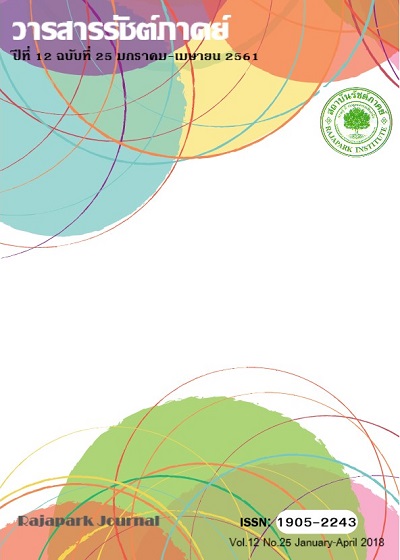Science Education Reform on The Basic Education Level
Main Article Content
Abstract
The objective is to develop and evaluate the model of Science Education Reform on the Basic Education Level by analyzing data to develop and evaluate the model. The study indicates that 1) Thailand’s education has definite objectives but fails to have regulatory agencies. Distribution of power is evident but genuine empowerment is still absent. The curriculum standards are not supportive for learning. Unlike Thailand, other foreign countries possess definite objectives. The curriculum standards are supportive for learning. 2) In terms of developing ways to reform, it is recommended to have a group of strategic committee. There are three following models. 3) In terms of assessing the model 3 is the most suitable. Science curriculum should be designed based on standard that combines between Concept and Performance Standards. The IPST should be responsible for such missions. The NIETS is in charge of organizing the national test for the Higher Standards. The OBEC is responsible for the evaluation and assessment procedure as standard base.
Article Details

This work is licensed under a Creative Commons Attribution-NonCommercial-NoDerivatives 4.0 International License.
Views and opinions appearing in the Journal it is the responsibility of the author of the article, and does not constitute the view and responsibility of the editorial team.
References
กระทรวงศึกษาธิการกระทรวงศึกษาธิการ. (2551). หลักสูตรแกนกลางการศึกษาขั้นพื้นฐาน พุทธศักราช 2551. กรุงเทพมหานคร: โรงพิมพิ์คุรุสภาลาดพร้าว.
วิทยากร เชียงกูล. (2550). สภาวะการศึกษาไทยปี 2549/2550 การแก้ปัญหาและการปฏิรูปอย่างเป็นระบบองค์รวม. กรุงเทพมหานคร: สำนักพิมพ์ห้างหุ้นส่วนจำกัด วี.ที. ซีคอมมิวนิเคชั่น.
สมเกียรติ ตั้งกิจวานิชย์ และคณะ. (2555). การปฏิรูปการศึกษารอบใหม่: สู่การศึกษาที่มีคุณภาพอย่างทั่วถึง และระบบการบริหารและการเงินเพื่อสร้างความรับผิดชอบในการจัดการศึกษา. กรุงเทพมหานคร: สถาบันวิจัยเพื่อการพัฒนาประเทศไทย (TDRI).
บุญเกียรติ การะเวกพันธุ์ และคณะ. (2560). การบริหารงานภาครัฐแนวใหม่. กรุงเทพมหานคร: สถาบันพระปกเกล้า.
สำนักงานคณะกรรมการพัฒนาการเศรษฐกิจและสังคมแห่งชาติ(สศช.). (2554). แผนพัฒนาเศรษฐกิจและสังคมแห่งชาติ ฉบับที่ 10 ( พ.ศ. 2550 - 2554 ). พิมพ์ครั้งที่ 1.กรุงเทพมหานคร.
สำนักนโยบายและยุทธศาสตร์ สำนักงานปลัดกระทรวงศึกษาธิการ. (2558). รายงานความก้าวหน้าปฏิรูปการศึกษา. กลุ่มประชาสัมพันธ์, สำนักงานรัฐมนตรี.
สำนักงานเลขาธิการสภาการศึกษา (สกศ.). (2554). ยุทธศาสตร์การผลิตและพัฒนากำลังคนของประเทศในช่วงการปฏิรูปการศึกษาทศวรรษที่สอง พ.ศ.2552-2561. พิมพ์ครั้งที่ 1. กรุงเทพมหานคร: บริษัทพริกหวานกราฟฟิค.
สำนักงานเลขาธิการสภาการศึกษา (สกศ.). (2555). รายงานการสัมมนาเรื่องนโยบายการปฏิรูปวิทยาศาสตร์ศึกษาของประเทศไทย. พิมพ์ครั้งที่ 1. กรุงเทพมหานคร: บริษัทพริกหวานกราฟฟิค.
สำนักงานเลขาธิการสภาการศึกษา (สกศ.). (2559). รายงานผลการประเมินการบังคับใช้กฎหมายการศึกษาและปรับปรุงแก้ไขกฎหมายการศึกษาให้สอดคล้องและสนับสนุนการปฏิรูปการศึกษาของชาติประจำปีงบประมาณ 2559. พิมพ์ครั้งที่ 1. กรุงเทพมหานคร: สำนักงานเลขาธิการสภาการศึกษา.
ศุภณัฏฐ์ ศศิวุฒิวัฒน์. (2555). ความล้มเหลวของระบบการประเมินผลการศึกษาไทย: สาเหตุและข้อเสนอแนะ. กรุงเทพมหานคร: สถาบันวิจัยเพื่อการพัฒนาประเทศไทย (TDRI).
Dennis A. Rondinelli, John Middleton and Adriaan M. Verspoor. (1990). Planning Education Reforms in Developing Countries: The Contingency Approach. Duke University Press USA.
Boonkiat Kawaravak (2017). New round-up education reform: to quality education Accomplishments and Administrative and financial systems to create responsibility for educational management. Bangkok Bangkok: Institution King Prajadhipok's Institute
Office of the National Economic and Social Development Board (NESDB) (2011). National Economic and Social Development Plan No 10 (2007 - 2011). 1. Bangkok.
Office of Policy and Strategy Office of the Permanent Secretary for Education. (2558) Progress Report on Education Reform Public Relations, Office of the Minister
Ministry of Education. (2008). Core Curriculum for Basic Education. 2551. Bangkok: The Teachers' Council of Lat Phrao.
Reimers, E. V. 2003. Teacher Professional Development: An International Review of the Literature. Paris: UNESCO.
Rodger, W. B. (1993). Reforming Science Education. New York: Teachers College Press.
Supanit Sasitawatwat (2012). Failure of the Thai Education Assessment System: Causes and Suggestions. Bangkok: Thailand Development Research Institute (TDRI)
Sharon, J. L. 2000. Equity and science education reform. New Jersey: Lawrence Erlbaum Associates, Inc.
Somkeat Tangkitwanit et all (2013)Accomplishments and administrative and financial systems to create responsibility for educational management. Bangkok: Thailand Development Research Institute (TDRI)
The Strategy for the Production and Development of Human Resources in the Second Educational Reform Phase, 2009-2018. 1st edition. Bangkok: Chili Sweet Graphic.
_______. (2555) The seminar on Science Education Reform in Thailand. 1st edition. Bangkok: Chili Sweet Graphic.
_______. (2559) Report on the results of the evaluation of law enforcement, education and revision of educational law in accordance with and support for national educational reform for fiscal year 2016. 1. Bangkok: Secretariat of the Council of Education.
Wittayakorn Chengoon(2007). Thailand's education situation in 2006/2007. Solution and reform in a holistic way. Bangkok: VC Communications Co., Ltd.


